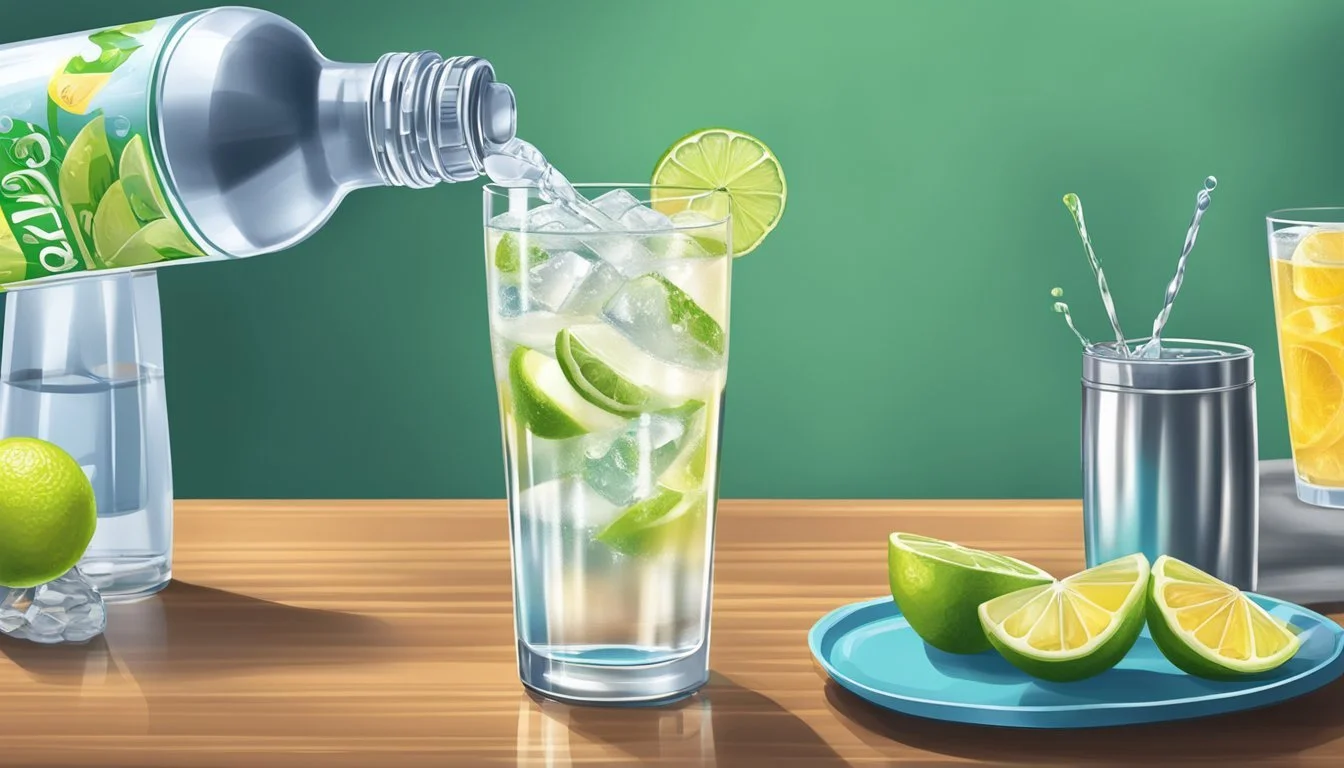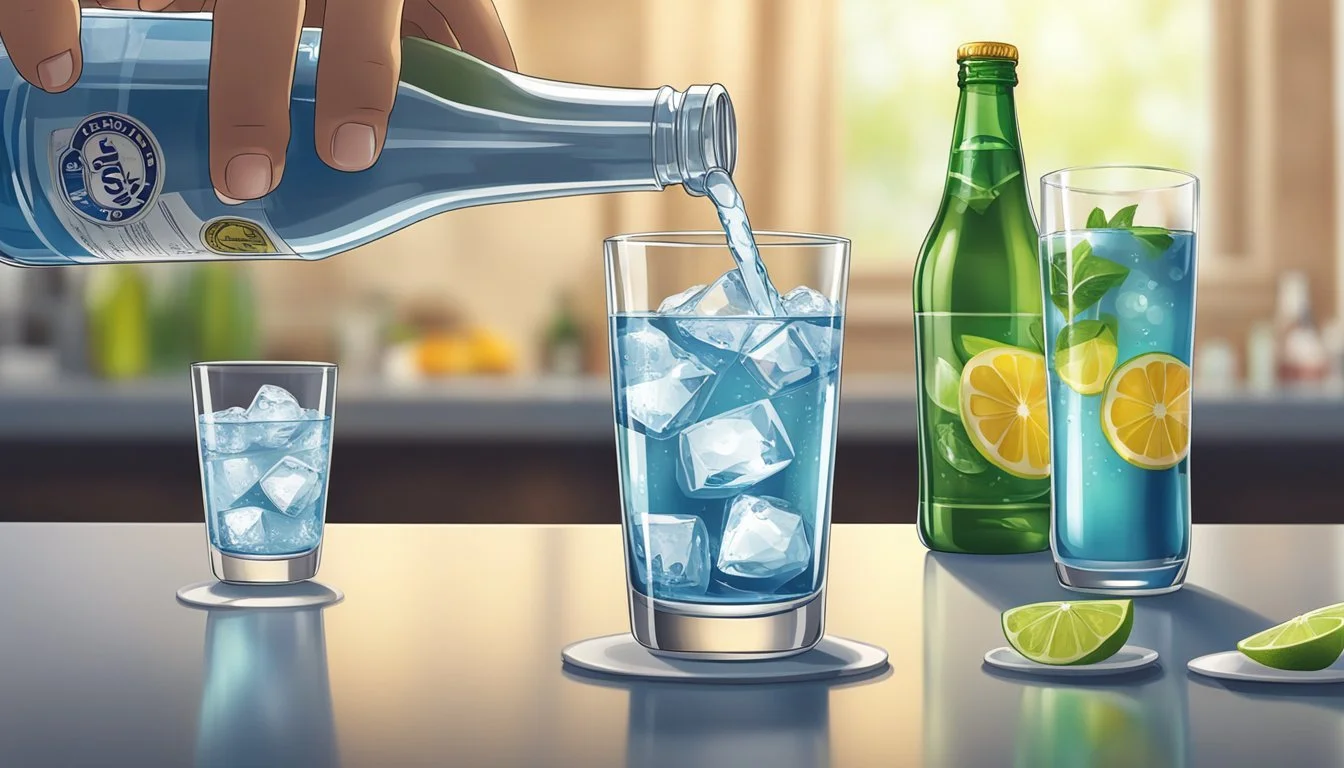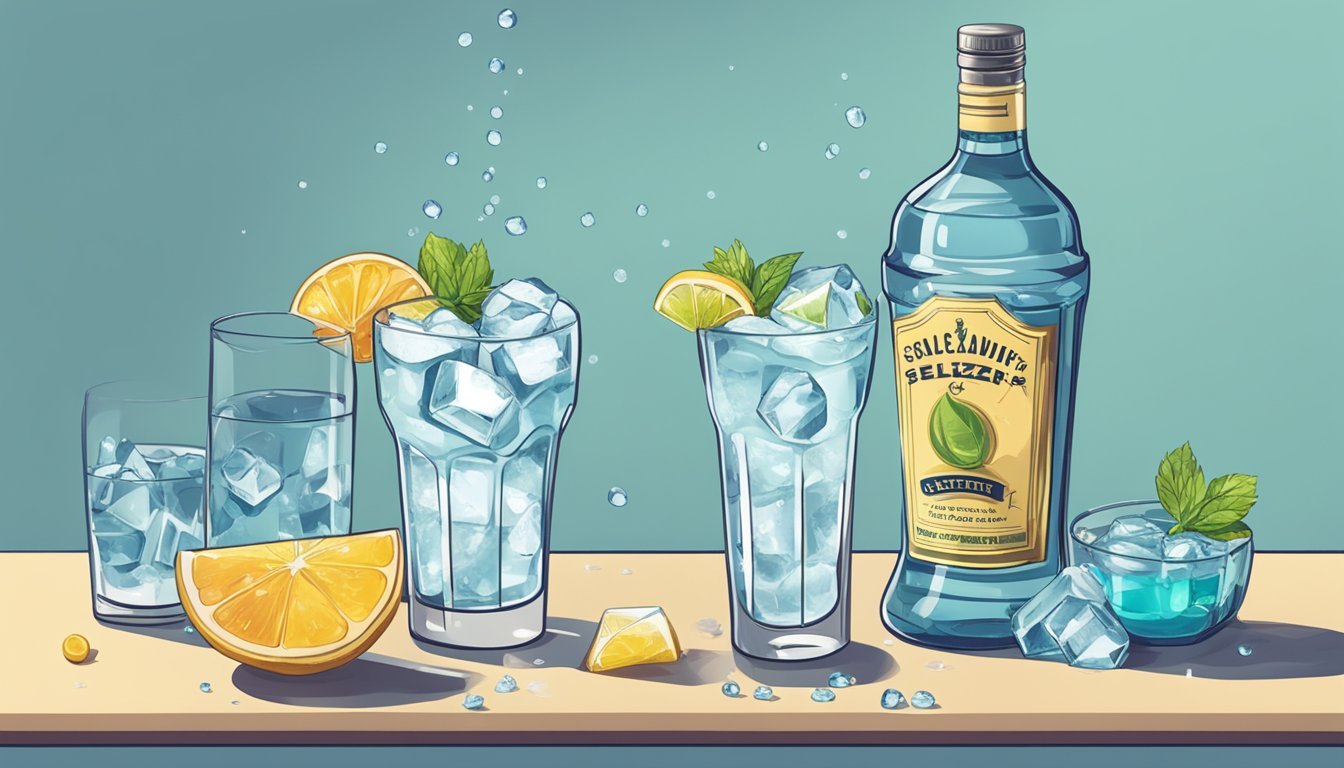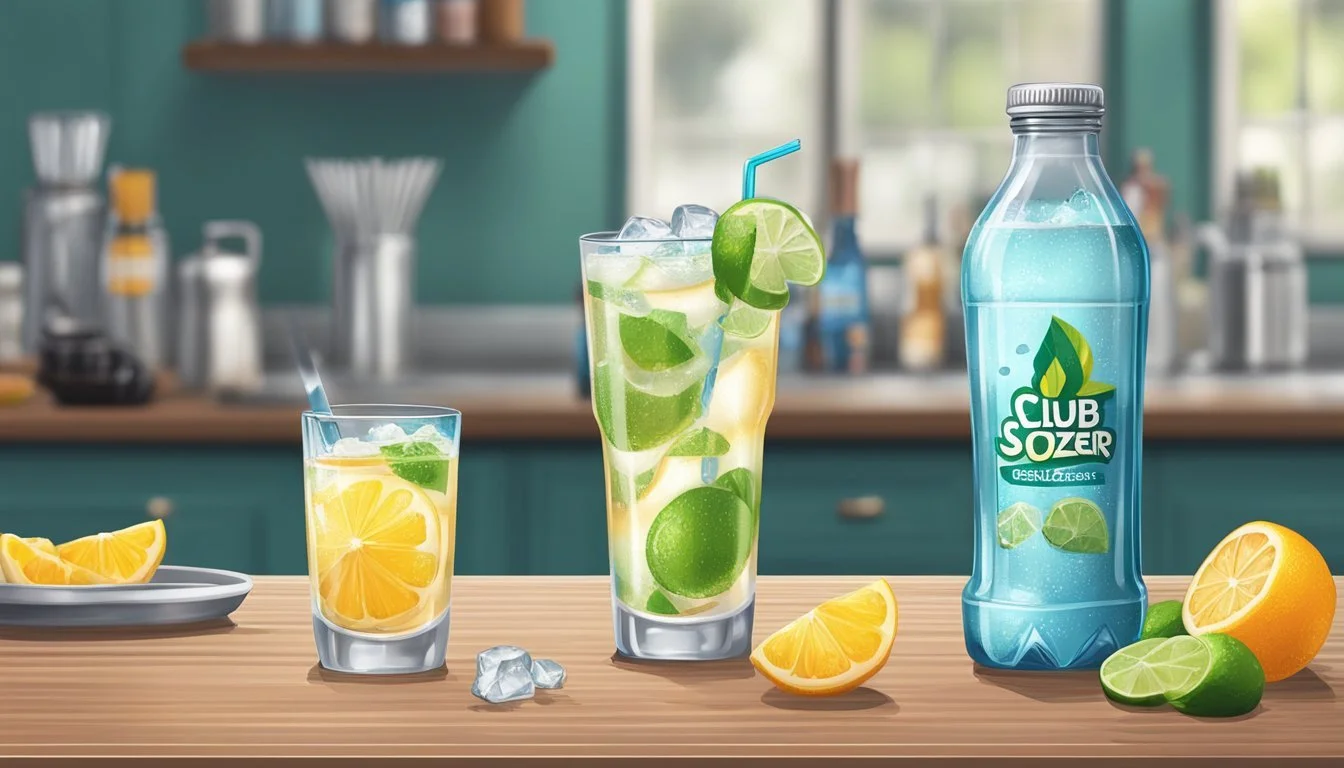How to Substitute Seltzer Water for Club Soda
A Simple Guide
In the world of carbonated beverages, the distinctions between various types can often blur, particularly when considering seltzer and club soda. Both are effervescent waters, but they bear notable differences in taste and ingredients. Club soda is carbonated water that has minerals added to it, often including compounds like sodium bicarbonate or potassium sulfate, which contribute to its distinct flavor profile. Seltzer, on the other hand, is straightforward carbonated water without any added minerals, offering a cleaner and more neutral taste.
The desire to substitute seltzer water for club soda arises in various scenarios, including cocktail mixing, baking, and general cooking. Seltzer water serves as an excellent substitution for club soda due to its similar effervescence. The lack of additional minerals means that seltzer water may not present the same slight saltiness or mineral taste of club soda; however, in most cases, this difference does not significantly alter the final flavor profile of the recipe or beverage being prepared.
When using seltzer water as a replacement for club soda, the recommended ratio is a one-to-one substitution. This straightforward exchange ensures that the desired carbonation level in the recipe or drink remains consistent. For most culinary applications and drink formulations, opting for seltzer water will yield results that respect the integrity of the original concoction, making it a reliable and accessible alternative for club soda.
Understanding Carbonated Water
When substituting seltzer water for club soda, it's crucial to grasp the nuances of carbonated water varieties, particularly in terms of mineral content and the effects on flavor and texture.
Differences Between Club Soda and Seltzer
Club soda and seltzer are both forms of carbonated water, yet they are distinct products. The main difference lies in their content:
Seltzer: It is the simplest form of carbonated water, with no added minerals. It provides effervescence without altering the taste of the drink it's added to.
Club Soda: This is carbonated water to which minerals have been added. Common minerals include sodium bicarbonate, potassium sulfate, and sodium chloride. These give club soda a slightly salty taste.
This distinction is important for those looking to replicate the flavor and mouthfeel of a beverage traditionally made with club soda.
The Role of Minerals and Salts
The minerals and salts in carbonated water play a significant role in its final taste profile:
Minerals: In club soda, added minerals can enhance the flavor of cocktails or other mixed drinks. Sparkling mineral water, sourced from springs, may naturally contain minerals like potassium, sodium, and magnesium, which also influence its taste and could result in a similar mouthfeel to club soda.
Salts: Added salts in club soda such as sodium bicarbonate affect both the acidity and the taste, making it a suitable stand-in for seltzer if one aims to closely mimic the original recipe's taste.
Understanding these components helps in selecting an appropriate substitute for club soda, ensuring the integrity of the beverage's desired taste and texture.
Substitution Basics
Using seltzer water as a substitute for club soda is straightforward, but the impact on your beverage's flavor profile and texture should be considered to ensure the best culinary experience.
When to Use Seltzer as a Substitute
Seltzer is an excellent substitute for club soda when one desires a mixer with a neutral taste. It's particularly suitable in recipes or beverages where the additional mineral taste of club soda is not desired or would alter the intended flavor significantly.
Recommendation:
Use seltzer in a 1:1 ratio for club soda to maintain carbonation levels.
Impact on Taste and Texture
The absence of added minerals in seltzer means it imparts no extra flavor, maintaining the integrity of the original beverage or recipe. In terms of texture, seltzer provides a similar effervescence as club soda, contributing to the sensory experience of the drink or dish.
Flavor Profile:
Seltzer water offers a clean and crisp experience without the slight saltiness club soda might provide.
Texture:
The bubbles in seltzer are typically finer, which can influence the mouthfeel slightly, offering a smooth fizz.
Cocktails and Mixology
When substituting seltzer water for club soda in cocktails, the goal is to maintain the drink's desired effervescence and flavor profile. An adept mixologist understands the nuances that sparkling water can contribute to a cocktail's overall experience.
Creating Cocktails with Seltzer
In the realm of cocktails, seltzer can seamlessly replace club soda. The carbonation present in seltzer provides the same fizz, enhancing the sensory experience of the drink. For instance, a Gin Fizz traditionally requires a bubbly mixer; seltzer fulfills this role without altering the fundamental taste. When making a cocktail with seltzer, it's important to consider cocktail mixers such as simple syrup, which can balance out any slight taste differences.
Gin and Tonic: A crisp choice for seltzer substitution, ensuring the gin's botanicals shine without additional flavors.
Ingredients:
2 oz Gin
4 oz Seltzer
Lime wedge
Sparkling Wine Cocktail: Seltzer can invigorate this cocktail without overshadowing the wine's delicate notes.
Ingredients:
1 oz Simple syrup
1 oz Lemon juice
4 oz Sparkling wine
Splash of Seltzer
Mocktails and Non-Alcoholic Options
Mocktails benefit from seltzer's neutrality, making it a prime mixer for non-alcoholic drinks where the absence of spirits shifts focus to the mixer's quality. Seltzer's carbonation adds a textual dimension to mocktails, mimicking the complexity often provided by alcohol. Flavored waters or seltzer can introduce a subtle layer without adding sugar, keeping the profile light yet satisfying.
Non-Alcoholic Sangria: Seltzer brings a festive effervescence to this fruit-forward mocktail.
Ingredients:
Mixed fruits
Juice blend
Seltzer to top
Cucumber Mint Cooler: This mocktail showcases how seltzer water complements and elevates natural flavors.
Ingredients:
Cucumber slices
Mint leaves
Lime juice
Seltzer to fill
Culinary Uses Beyond Beverages
Seltzer water can be an innovative ingredient in culinary applications, particularly in baking and cooking. It introduces a level of effervescence and lightness to recipes that are traditionally achieved with other leavening agents.
Baking with Seltzer
When baking, seltzer water can serve as a leavening agent to make a variety of baked goods fluffier and lighter. Here's how seltzer effectively works in baking:
Leavening: It can replace the carbonation and leavening effects typically provided by baking soda.
Egg Replacement: It can act as a binding agent in recipes, offering an alternative for those with egg allergies.
Example: In pancake batter, replacing milk with seltzer water helps create airier pancakes with a delicate crumb.
Seltzer in Cooking Recipes
In cooking, seltzer water is not just limited to creating fizzy drinks but can also be a key ingredient in many recipes:
Lighter Batter: When preparing a batter for fried foods, using seltzer water instead of flat liquids produces a crispier and lighter crust due to the bubbles creating small air pockets.
Soups and Sauces: A dash of seltzer can add lightness to soups and sauces without altering the flavor profile.
Note: While substituting, it's essential to use seltzer without added flavorings to ensure the taste of the dish remains unchanged.
Health and Nutrition Considerations
When substituting seltzer water for club soda, one should pay attention to nutritional aspects such as caloric intake, sugar content, and the levels of sodium and minerals contained in the water. This information is crucial for maintaining both health and the integrity of the beverage's flavor.
Caloric and Sugar Content
Seltzer water typically contains zero calories and no added sugars, making it a suitable choice for those monitoring their caloric intake or sugar consumption. Unlike some carbonated beverages, seltzer water does not compromise one's hydration status, as it provides the hydrating benefits of regular water.
Sodium and Mineral Content
Seltzer water generally has a minimal mineral content, which means it usually has lower sodium levels compared to club soda. Club soda often has added minerals like sodium bicarbonate, sodium citrate, or potassium sulfate for taste, which can contribute to its sodium content. The absence of these added minerals in seltzer water makes it a preferable option for individuals managing their sodium intake.
Alternative Substitutions for Club Soda
When looking to substitute club soda, one has a variety of options, ranging from other types of carbonated waters to homemade creations that can mimic the effervescent quality of club soda in drinks and recipes.
Other Carbonated Water Variants
Soda Water/Seltzer: Often used interchangeably with club soda, seltzer is carbonated water without added minerals. It provides a similar bubble and neutral taste.
Sparkling Mineral Water: This is carbonated spring water naturally rich in minerals. Brands like LaCroix offer a wide range of flavored options that can add a unique twist to your beverage.
Homemade Substitutes
Home Carbonation Systems: Devices like SodaStream allow you to carbonate your own water, giving you the ability to control the level of effervescence.
Homemade Sodas: By dissolving carbon dioxide in water using a home carbonation system, you can create a range of flavored sodas using natural ingredients like fruit juices or syrups.
One should choose a club soda substitute based on the desired flavor profile and carbonation level for their specific culinary or beverage application. Tonic water, for instance, adds a bitter taste due to quinine, making it suitable for certain cocktails but not for all recipes where a neutral flavor is required. Ginger ale's sweet, gingery profile can offer a unique complexity to drinks, yet it might not be suitable for savory dishes that require a neutral-tasting carbonated liquid. Choosing the right substitute will ensure the integrity of the dish or drink is maintained without compromising on taste or texture.
DIY Carbonation Techniques
Substituting seltzer water for club soda can be easily achieved with the right tools and techniques. Home carbonation systems offer control over fizziness, while flavoring creates tailored carbonated beverages.
Using Home Carbonation Systems
Home carbonation systems, such as SodaStream, are popular for their convenience in carbonating water at home. These systems typically involve a carbonator (CO2 canister) that injects carbon dioxide into water at the press of a button. To replace club soda, individuals can carbonate chilled spring water to achieve a similar taste and carbonation level. Consumers should follow the manufacturer's instructions carefully to avoid over-carbonation.
Creating Flavored Carbonated Beverages
Flavor is a crucial aspect of beverage enjoyment, and carbonated juice or homemade flavored seltzer can be an excellent alternative to club soda. To infuse flavors, one may start with a base of carbonated water from their home system and then add natural ingredients. Examples include:
Carbonated Juice:
Start with fresh or store-bought juice.
Gently mix it with carbonated water in a 1:3 ratio.
DIY LaCroix-style Seltzer:
Use fruit essences or a splash of fruit juice to mimic popular flavors.
Focus on maintaining a subtle flavor profile to closely resemble LaCroix beverages.
Carbonation can greatly enhance the sensory experience of a beverage, giving it a crisp, refreshing edge. When emulating club soda, it's essential to maintain balance without overpowering the drink with too much flavor or carbonation.
Frequently Asked Questions
This section addresses common concerns and provides practical tips on substituting seltzer water for club soda, with a focus on maintaining taste and carbonation quality.
Addressing Common Substitution Queries
Can seltzer water be used as a direct substitute for club soda? Yes, seltzer water can replace club soda in a 1:1 ratio. Although both are carbonated, club soda contains added mineral salts which seltzer lacks, potentially altering the taste profile slightly.
What is the difference between seltzer water and soda water? Seltzer water is simply carbonated water with no added minerals. In contrast, soda water typically refers to seltzer water that has been infused with mineral salts, making it similar to club soda.
Will the lack of mineral salts in seltzer affect the flavor of a drink? The absence of mineral salts may result in a cleaner taste as seltzer is free from the slight saltiness of club soda. However, for most taste preferences and cocktail recipes, this change is minimal.
Is seltzer water less fizzy than club soda? The fizziness or carbonation level in seltzer water generally matches that of club soda, ensuring a similar bubbly sensation when used as a substitute.
Tips for Perfect Carbonation
To retain the fizziness in drinks:
Use cold seltzer water, since carbonation is better maintained at lower temperatures.
Pour gently alongside the edge of the glass to reduce aerating and loss of bubbles.
For more fizz in seltzer water:
Consider purchasing a carbonator to adjust the level of carbonation according to the desired bubbly effect.
Check the expiration date, as seltzer water can lose carbonation over time.






